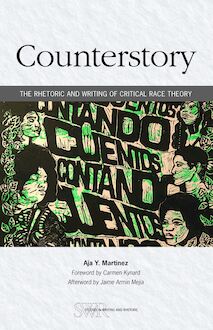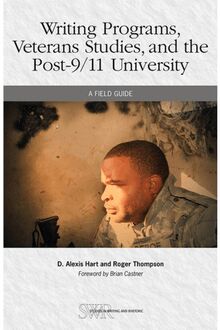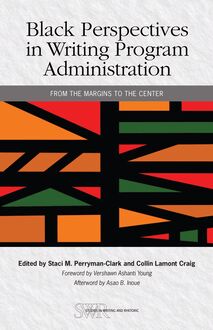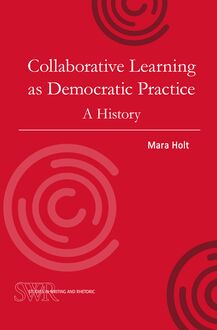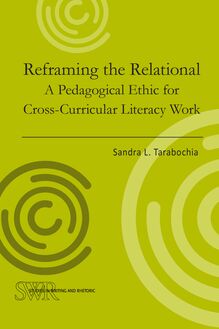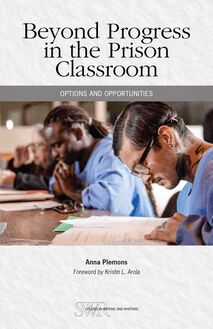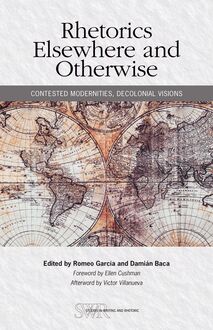-
 Univers
Univers
-
 Ebooks
Ebooks
-
 Livres audio
Livres audio
-
 Presse
Presse
-
 Podcasts
Podcasts
-
 BD
BD
-
 Documents
Documents
-
- Cours
- Révisions
- Ressources pédagogiques
- Sciences de l’éducation
- Manuels scolaires
- Langues
- Travaux de classe
- Annales de BEP
- Etudes supérieures
- Maternelle et primaire
- Fiches de lecture
- Orientation scolaire
- Méthodologie
- Corrigés de devoir
- Annales d’examens et concours
- Annales du bac
- Annales du brevet
- Rapports de stage
La lecture à portée de main
Vous pourrez modifier la taille du texte de cet ouvrage
Découvre YouScribe en t'inscrivant gratuitement
Je m'inscrisDécouvre YouScribe en t'inscrivant gratuitement
Je m'inscrisEn savoir plus
Vous pourrez modifier la taille du texte de cet ouvrage
En savoir plus

Description
The discipline of composition and rhetoric stands at a crossroad in its pedagogical, research, and public commitments. Decolonial ruptures in writing and rhetoric studies work to build new horizons, new histories, of local knowledges and meaning-making practices that break from Western hegemonic models of knowledge production. This collection functions as one access point within a constellation of such work, forming an ecology of decolonial shifts informed by strategies for potentially decolonizing language and literacy practices, writing and rhetorical instruction, and research practices and methods. Rhetorics elsewhere and otherwise emerge across a spectrum, from geo- and body politics of knowledge and understanding to local histories emerging from colonial peripheries. Romeo García and Damián Baca offer the expressions elsewhere and otherwise as invitations to join existing networks and envision pluriversal ways of thinking, writing, and teaching that surpass the field’s Eurocentric geographies, cartographies, and chronologies.
Sujets
Informations
| Publié par | National Council of Teachers of English (NCTE) |
| Date de parution | 14 mars 2019 |
| Nombre de lectures | 0 |
| EAN13 | 9780814100394 |
| Langue | English |
Informations légales : prix de location à la page 0,1500€. Cette information est donnée uniquement à titre indicatif conformément à la législation en vigueur.
Extrait
CCCC STUDIES IN WRITING & RHETORIC
Edited by Steve Parks, University of Virginia
The aim of the CCCC Studies in Writing & Rhetoric (SWR) Series is to influence how we think about language in action and especially how writing gets taught at the college level. The methods of studies vary from the critical to historical to linguistic to ethnographic, and their authors draw on work in various fields that inform composition—including rhetoric, communication, education, discourse analysis, psychology, cultural studies, and literature. Their focuses are similarly diverse—ranging from individual writers and teachers, to work on classrooms and communities and curricula, to analyses of the social, political, and material contexts of writing and its teaching.
SWR was one of the first scholarly book series to focus on the teaching of writing. It was established in 1980 by the Conference on College Composition and Communication (CCCC) in order to promote research in the emerging field of writing studies. As our field has grown, the research sponsored by SWR has continued to articulate the commitment of CCCC to supporting the work of writing teachers as reflective practitioners and intellectuals.
We are eager to identify influential work in writing and rhetoric as it emerges. We thus ask authors to send us project proposals that clearly situate their work in the field and show how they aim to redirect our ongoing conversations about writing and its teaching. Proposals should include an overview of the project, a brief annotated table of contents, and a sample chapter. They should not exceed 10,000 words.
To submit a proposal, please register as an author at www.editorialmanager.com/nctebp . Once registered, follow the steps to submit a proposal (be sure to choose SWR Book Proposal from the drop-down list of article submission types).
SWR Editorial Advisory Board
Steve Parks, SWR Editor, University of Virginia
André Habet, Associate Editor, Syracuse University
Kevin Browne, University of the West Indies
Ellen Cushman, Northeastern University
Haivan Hoang, University of Massachusetts-Amherst
Asao Inoue, University of Washington Tacoma
Carmen Kynard, John Jay College of Criminal Justice
Min-Zhan Lu, University of Louisville
Paula Mathieu, Boston College
Nedra Reynolds, University of Rhode Island
Jacqueline Rhodes, Michigan State University
Eileen Schell, Syracuse University
Jody Shipka, University of Maryland, Baltimore County
Vershawn Ashanti Young, University of Waterloo
Staff Editor: Bonny Graham Manuscript Editor: Lee Erwin Series Editor: Steve Parks Interior Design: Mary Rohrer Cover Design: Pat Mayer Cover Image: iStockphoto.com/baona
NCTE Stock Number: 41410; eStock Number: 41427 ISBN 978-0-8141-4141-0; eISBN 978-0-8141-4142-7
Copyright © 2019 by the Conference on College Composition and Communication of the National Council of Teachers of English.
All rights reserved. No part of this publication may be reproduced or transmitted in any form or by any means, electronic or mechanical, including photocopy, or any information storage and retrieval system, without permission from the copyright holder. Printed in the United States of America.
It is the policy of NCTE in its journals and other publications to provide a forum for the open discussion of ideas concerning the content and the teaching of English and the language arts. Publicity accorded to any particular point of view does not imply endorsement by the Executive Committee, the Board of Directors, or the membership at large, except in announcements of policy, where such endorsement is clearly specified.
NCTE provides equal employment opportunity (EEO) to all staff members and applicants for employment without regard to race, color, religion, sex, national origin, age, physical, mental or perceived handicap/disability, sexual orientation including gender identity or expression, ancestry, genetic information, marital status, military status, unfavorable discharge from military service, pregnancy, citizenship status, personal appearance, matriculation or political affiliation, or any other protected status under applicable federal, state, and local laws.
Every effort has been made to provide current URLs and email addresses, but because of the rapidly changing nature of the web, some sites and addresses may no longer be accessible.
Library of Congress Cataloging-in-Publication Data
A catalog record of this book has been requested.
CONTENTS
Foreword
Ellen Cushman
Acknowledgments
Introduction: Hopes and Visions: The Possibility of Decolonial Options
Romeo García and Damián Baca
1. Writing about Others Writing: Some Field Notes
Kate Vieira
2. Intersectional Reflexivity and Decolonial Rhetorics: From Palestine to Aztlán
Haneen Shafeeq Ghabra and Bernadette Marie Calafell
3. Rhetorical Autoethnography: Delinking English Language Learning in a Family Oral History
Steven Alvarez
4. Arabizing Vernacular Discourse: A Rhetorical Analysis of Tunisian Revolutionary Graffiti
Fatima Zahrae Chrifi Alaoui
5. La Cultura Nos Cura: Reclaiming Decolonial Epistemologies through Medicinal History and Quilting as Method
Iris D. Ruiz and Sonia C. Arellano
6. Beyond Colonial Hegemonies: Writing Scholarship and Pedagogy with Nyāyasutra
Shyam Sharma
7. Moving the Body: Preamble to a Theory of Vernacular Rhetoric, or How a Caribbean Rhetoric[ian] Is Composed
Kevin Adonis Browne
Afterword
Victor Villanueva
Index
Editors
Contributors
FOREWORD
The stories told within these pages ask for the listener to bear witness to and share the obligation of challenging the imperial legacies of power and knowledge that have continued to structure the relationships we can have to place/land, history, our bodies, and one another. The book coheres around the subtle workings of power in everyday forms of epistemic obedience: those disciplining moments that have categorized, delineated, barred, tracked, devalued, and rigidly structured each and every person. At the same time, the authors illustrate the practice of epistemic disobedience—innovation, resistance and challenge, and border crossing—present within those everyday moments of disciplining.
The authors write from the self, first and foremost, as the site where we all experience the workings of epistemic obedience. Epistemic obedience manifests itself when we are placed into categories of race, gender, sex, family, and class—from the day we are born to the moment we read this book and across every educational moment in between. To some greater or lesser extent, each of us is dehumanized by the structuration demanded by epistemic obedience. No one escapes the process of being assessed, read, categorized, tracked, put into place, and positioned in educational systems. What is to be done?
The locations and positioning of the authors within these pages offer hope in their fluidity. The authors remind us that we are where we learn. We become who we are through the choices we make across everyday disciplining moments. Along the way, they demonstrate how important it is to epistemically delink during moments when we are being written and when we write others. They illustrate how important it is to cross borders of difference and division in an effort to find more capacious ways of being in this world. The authors all demonstrate how important it is to tolerate ambiguity and create liminality when learning, if we hope to achieve alliance building.
Importantly, this collection offers ways to identify local, everyday, “vernacular” knowledges as the first indicators of the legacy of empire. These knowledges and linguistic strivings mark the place where epistemic obedience has failed to take hold, the site where epistemic disobedience begins. They demonstrate the linguistic strivings necessary in the struggle to re-place and re-locate ourselves. They provide ways to challenge the workings of power in the process of becoming epistemically (dis)obedient.
Perhaps most importantly, the authors in this collection offer insight into the recovery work necessary in modern society, however partial, fragmented, and piecemeal it may be. The recovery of suppressed knowledges, languages, histories, and practices always affords a mosaic image of the self, discernable as a whole from the parts only when viewed from a distance. Recovery work is implicit and explicit throughout the writing of Rhetorics Elsewhere and Otherwise , making it an indispensable collection of thinking and doing.
Ellen Cushman Northeastern University
ACKNOWLEDGMENTS
We wish to acknowledge the contributors who helped shape this collection. Many thanks to Steve Parks for his editorial support, valuable advice, and encouragement. Thanks as well to the reviewers who read our manuscript carefully and provided insightful feedback. Finally, we are especially grateful to Ellen Cushman and Victor Villanueva for their compassion and unconditional support throughout this process.
INTRODUCTION HOPES AND VISIONS: THE POSSIBILITY OF DECOLONIAL OPTIONS
Romeo García
University of Utah
Damián Baca
University of Arizona
In the late 1980s and early 1990s, postcolonial studies emerged as a field of inquiry within writing and rhetorical studies (WRS). It offered for compositionists and rhetoricians a conceptual and theoretical vocabulary for identifying the effects of colonialism and imperialism in the university. These effects could be observed in the research taught, the theory and pedagogy developed, and the classrooms that educated minoritized as well as marginalized students. Through terms and concepts such as contact zones (Pratt) and borderlands (Anzaldúa), scholars found a way to name how the colonial traffics in the normative and to develop a political model for intervening in dominant models of Western culture in WRS. As a result, scholars considered how to approach the classroom as a borderland (Lu) and how the field was failing to inco
-
 Univers
Univers
-
 Ebooks
Ebooks
-
 Livres audio
Livres audio
-
 Presse
Presse
-
 Podcasts
Podcasts
-
 BD
BD
-
 Documents
Documents
-
Jeunesse
-
Littérature
-
Ressources professionnelles
-
Santé et bien-être
-
Savoirs
-
Education
-
Loisirs et hobbies
-
Art, musique et cinéma
-
Actualité et débat de société
-
Jeunesse
-
Littérature
-
Ressources professionnelles
-
Santé et bien-être
-
Savoirs
-
Education
-
Loisirs et hobbies
-
Art, musique et cinéma
-
Actualité et débat de société
-
Actualités
-
Lifestyle
-
Presse jeunesse
-
Presse professionnelle
-
Pratique
-
Presse sportive
-
Presse internationale
-
Culture & Médias
-
Action et Aventures
-
Science-fiction et Fantasy
-
Société
-
Jeunesse
-
Littérature
-
Ressources professionnelles
-
Santé et bien-être
-
Savoirs
-
Education
-
Loisirs et hobbies
-
Art, musique et cinéma
-
Actualité et débat de société
- Cours
- Révisions
- Ressources pédagogiques
- Sciences de l’éducation
- Manuels scolaires
- Langues
- Travaux de classe
- Annales de BEP
- Etudes supérieures
- Maternelle et primaire
- Fiches de lecture
- Orientation scolaire
- Méthodologie
- Corrigés de devoir
- Annales d’examens et concours
- Annales du bac
- Annales du brevet
- Rapports de stage
